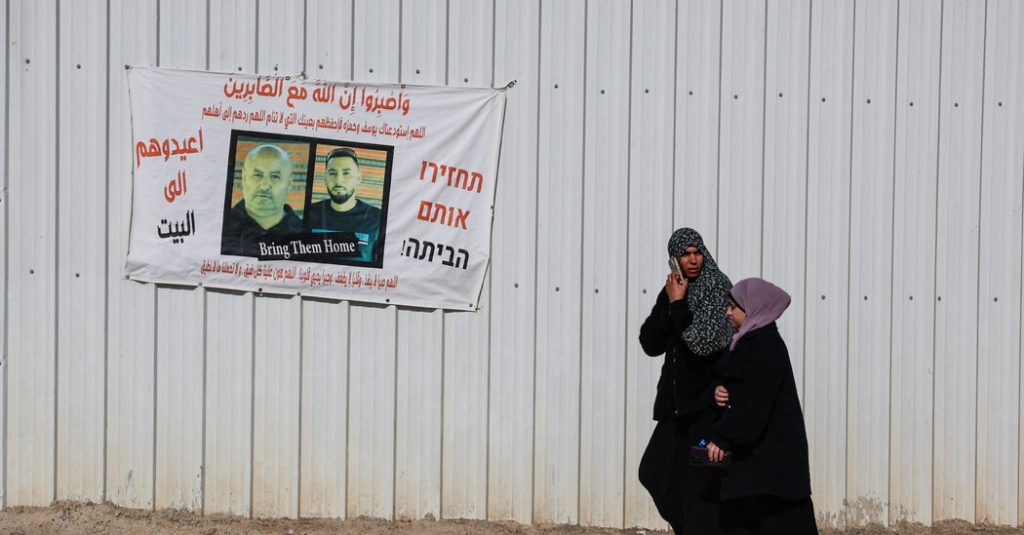The protracted conflict between Israel and Hamas continues to cast a long shadow over the lives of families whose loved ones were taken hostage during the October 7, 2023 attack. The recent confirmation of Hamza Ziyadne’s death, an Arab citizen of Israel held captive in Gaza, adds another tragic dimension to an already devastating situation. Ziyadne’s death follows closely on the heels of the confirmed death of his father, Youssef, both of whose bodies were discovered in a tunnel in Rafah, alongside their deceased captors. The circumstances surrounding their deaths remain unclear, adding to the anguish of the families still awaiting the return of their loved ones. The discovery of the Ziyadnes’ bodies raises serious concerns about the fate of the remaining hostages, approximately 98 individuals, with around 36 already presumed dead by Israeli authorities. The lack of clarity regarding the cause of death for the Ziyadnes, whether by Israeli airstrikes or at the hands of their captors, further fuels the anxieties of those still waiting for news. This tragic development underscores the urgent need for a resolution to the hostage crisis, a component inextricably linked to the broader Israeli-Palestinian conflict.
The Ziyadnes’ story highlights the indiscriminate nature of the Hamas attacks, impacting even Israeli Arab citizens. Hamza, like his father, belonged to the Bedouin Arab minority, a marginalized group within Israeli society, often lacking essential services and resources. The family’s ordeal began at the Israeli kibbutz where Youssef worked, where Hamza, his father, and two younger siblings, Bilal and Aisha, were taken hostage. Bilal and Aisha were subsequently released during a prisoner exchange in November 2023, leaving their father and brother in captivity. Hamza, a 23-year-old husband and father of two, is remembered by his family and friends as a nature lover with a deep affection for animals. The Hostages Family Forum, representing the families of the captives, laments the loss of Hamza and Youssef, emphasizing that their lives could have been saved with an earlier agreement. Their tragic fate underscores the human cost of the ongoing conflict and the desperate need for a negotiated solution.
The ongoing efforts to secure a ceasefire and a hostage release agreement between Israel and Hamas have been fraught with challenges. Mediators, including Qatar, Egypt, and the Biden administration, have facilitated talks, yet a breakthrough remains elusive. While occasional glimmers of optimism have emerged, they have been consistently followed by setbacks, with both sides holding firm to seemingly irreconcilable demands. Hamas insists on a complete Israeli withdrawal from Gaza and an end to the war as preconditions for releasing hostages, while Israel demands the dismantling of Hamas in Gaza and maintains its commitment to security control over the region. This stalemate continues to prolong the suffering of the hostages and their families, highlighting the complexities of the broader conflict.
The complexities of the conflict are further illustrated by the Israeli military’s recent announcement regarding the accidental deaths of two Israeli civilians during the October 7 attacks. The military’s investigation suggests that 17-year-old Tomer Eliaz-Arava was mistakenly identified as a militant and killed by Israeli forces repelling Hamas fighters in Nahal Oz. Furthermore, the military believes that Tomer’s mother, Dikla Arava, was likely killed by Israeli forces as Palestinian militants attempted to abduct her and her remaining family. These tragic incidents, occurring amidst the chaos and confusion of the initial attacks, underscore the devastating consequences of the conflict for all involved.
The hostage crisis remains a critical element in the larger Israeli-Palestinian conflict, further complicating the already intricate negotiations for a ceasefire. The human cost of this ongoing stalemate is immense, with families enduring prolonged periods of uncertainty and grief. The recent confirmation of Hamza Ziyadne’s death, along with his father’s, serves as a stark reminder of the urgent need for a resolution. While international mediators continue their efforts, the deeply entrenched positions of both Israel and Hamas pose significant obstacles to achieving a lasting peace and securing the release of the remaining hostages. The international community faces a formidable challenge in bridging the divide and facilitating a solution that addresses the core issues fueling the conflict while prioritizing the safety and well-being of all civilians caught in the crossfire.
The tragedy of the Ziyadne family, along with the ongoing plight of the remaining hostages, underscores the devastating impact of the Israeli-Palestinian conflict on individuals and families. The complex dynamics of the conflict, coupled with the seemingly intractable positions of both sides, make a resolution elusive. While diplomatic efforts continue, the human cost continues to mount, leaving behind a trail of grief and uncertainty. The international community must intensify its efforts to find a path towards a lasting peace that addresses the root causes of the conflict and ensures the safety and security of all those affected. The time for decisive action is now, before more lives are lost and more families are torn apart.


